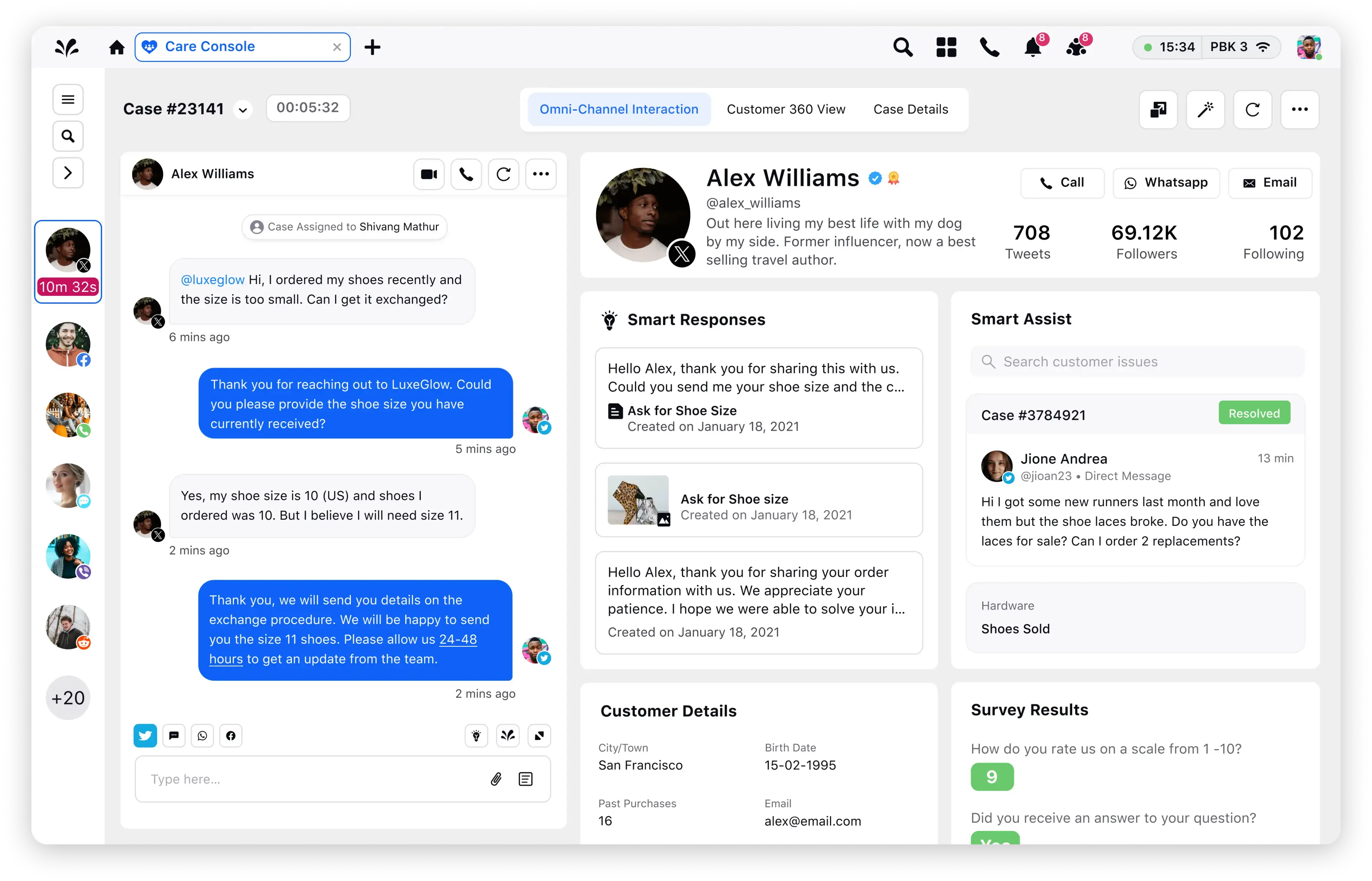The next generation of CCaaS is here
Digital-first customer service, enterprise-scale voice support. Redefine customer service with an AI-powered platform that unifies voice, digital and social channels. Power channel-less interactions and seamless resolution no matter the channel of contact.

The Role of Machine Learning (ML) in Customer Service
Today, customer service leaders face the daunting challenge of delivering exceptional service with increasingly limited resources. Headcounts are reduced and budgets are tighter than ever, yet top management demands positive customer experiences that drive long-term revenue.
Fortunately, a solution exists to automate the repetitive tasks that consume customer service agents' valuable time and patience. Machine learning in customer service is gaining widespread popularity because it achieves the coveted balance of low cost and high efficiency.
According to Statista, 57% of businesses already leverage machine learning in customer service to enhance the consumer experience. With this in mind, it's natural to wonder: How exactly are they benefiting?
In this blog, we'll delve into the role, benefits and use cases of machine learning in customer service, empowering you to elevate and align with the service standards set by top-tier brands.
What is machine learning in customer service?
Machine learning, a subset of artificial intelligence (AI), utilizes algorithms and statistical models to analyze data and make decisions or predictions without explicit programming. In the customer service domain, machine learning integrates with various tools such as chatbots, virtual agents and contact center CRM systems, augmenting their capabilities.
For instance, machine learning enhances the efficiency of contact center agents by automating routine tasks and providing insights to streamline workflows. Additionally, it enables personalized support by analyzing customer data to anticipate needs and tailor interactions accordingly.
By leveraging machine learning, customer service teams can optimize service delivery, improving agent productivity and customer satisfaction.
Top benefits of machine learning in customer service
Machine learning is increasingly integrated into customer service operations thanks to its numerous benefits. Let's examine what factors facilitate this shift.
- Proactive issue resolution
Machine learning enables predictive analytics, allowing you to anticipate customer needs and behaviors. By analyzing historical data, machine learning models can forecast customer churn, upsell opportunities and even predict support ticket volume, enabling proactive customer service. - Personalized customer experiences
Machine learning leverages customers' purchase history and browsing behavior to enable personalized interactions and recommendations. This leads to improved customer engagement, higher conversion rates and more meaningful interactions. - Improved efficiency
Machine learning in customer service automates repetitive tasks such as data entry, ticket routing and basic customer inquiries, allowing agents to focus on more complex issues. This leads to faster response times and higher agent productivity. - Enhanced customer insights
Machine learning algorithms can analyze large volumes of customer feedback, social media posts and other unstructured data to extract valuable insights. This helps you understand customer sentiment, identify emerging trends and address issues before they escalate. - 24/7 Availability
With machine learning-powered chatbots and virtual assistants, you can provide round-the-clock customer support, improving accessibility and responsiveness irrespective of time zones and geography. Customers, wherever they are, can get answers to their queries instantly without waiting for live agents. - Cost savings
Machine learning in customer support saves costs by streamlining customer service workflows through customer service automation, optimization and improved resource allocation. This allows you to plan and allocate resources more efficiently and invest in other areas of operations. - Minimal to zero chance of fraud
Machine learning algorithms can analyze patterns and detect anomalies in customer interactions and transactional data to quickly identify fraudulent activities such as unauthorized account access or unusual purchase behaviors. The good part is that continuously learning from new data improves these algorithms' accuracy over time.
Top 9 use cases of machine learning in customer service
Machine learning in customer support offers a wide range of applications that optimize daily customer service management and elevate customer experiences. Below are some of the top use cases:
1. AI-powered knowledge base
A robust and well-organized knowledge base is indispensable to harnessing the full potential of machine learning in customer service. A knowledge base is a centralized database of knowledge about a specific domain or topic. It is a comprehensive resource where information, documentation, articles, guides and other relevant content are stored and easily accessible to users.
Picture your customer service agent grappling with a complex issue. By integrating machine learning into the knowledge base, the system can interpret the context and meaning of the query, swiftly search the entire repository and return relevant suggestions to the agent. This enables rapid resolution with high accuracy, eliminating the need to transfer the customer to another department and minimizing hold times.
Knowledge bases are dynamic, meaning they are continually evolving. Each addition to the repository allows the machine learning model to learn and improve its ability to retrieve correct answers. Moreover, the model can proactively alert human administrators when updates or additions are needed, ensuring the knowledge base remains current and relevant.
By leveraging machine learning in customer service with AI-powered knowledge bases, you can streamline support processes, enhance agent efficiency and elevate the overall customer experience. This proactive approach fosters continuous learning and optimization, ultimately driving better outcomes in customer service operations.
2. Predictive customer support
By analyzing historical data and customer interactions, machine learning models can predict potential issues before they arise.
For example, a telecommunications company uses machine learning to analyze historical data and predict potential network issues. By identifying patterns in customer interactions and network performance, the company anticipates disruptions before they occur. For instance, it predicts slowdowns in specific areas during peak usage hours.
Armed with this insight, the company takes proactive measures, such as preemptive maintenance or resource reallocation, to minimize disruptions and enhance customer satisfaction. Through predictive customer support, the company reduces support tickets, improves reliability and builds customer loyalty.
3. Sentiment analysis
Natural language understanding (NLU) is a branch of machine learning that can decode customer intent for agent support. It delves into the subtleties of customer language to provide a deeper comprehension of the customer’s intent and sentiment.
Machine learning in customer service analyzes customer feedback, social media posts and other textual data to analyze sentiment and identify emerging trends. This enables you to understand customer sentiment in real time, identify areas for improvement and tailor responses to individual needs.
Do you know: With the modern conversational analytics platform, you can analyze 100% of customer conversations on 30+ social and digital channels. Not only can you discover trending topics and variations on customer intents, but also spot common themes and phrases in customer conversations and quickly detect unidentified contact drivers. Learn more about conversation analytics.
🔍 NLP and NLU: Are they both the same?
No, natural language understanding (NLU) and natural language processing (NLP) are related concepts within artificial intelligence and computational linguistics, but they serve distinct purposes.
While NLP encompasses a wide range of tasks related to the computational analysis of human language, NLU deals explicitly with the deeper understanding and interpretation of language inputs to derive meaning and intent. NLU is a specialized area within the broader field of NLP, focusing on the comprehension aspect of natural language processing.
Deep Dive: How Does NLP Elevate Your Customer Service?
4. Conversational AI
Conversational AI leverages natural language processing (NLP) algorithms to understand and interpret human language, allowing it to engage in customer conversations to simulate human interaction. It can answer frequently asked questions, provide product information, assist with troubleshooting and even process simple transactions.
Not only do these chatbots operate 24/7, but they can handle multiple conversations simultaneously without the need for additional resources. Whether handling a surge in customer inquiries during peak hours or scaling up to support a growing customer base, conversational AI chatbots adapt dynamically to meet demand.
How Sprinklr AI+ helps: With Sprinklr AI+, you can instantly deploy generative AI-powered conversational bots. You can boost self-serve rates by providing deeply contextual and relevant responses and enriching user journeys through dynamic conversations. Sprinklr’s unified platform seamlessly integrates with intelligent routing and case management features, ensuring that conversational bots work in tandem to escalate cases to the appropriate agents with full context transfer. This streamlined approach guarantees conversational continuity across 25+ channels and accelerates resolution rates, empowering you to deliver exceptional customer experiences effortlessly.

5. Agent assist
Machine learning in customer service acts as a mighty co-pilot for your team of live agents. AI assistants, driven by machine learning algorithms, provide agents with real-time assistance during live conversations. These tools offer a range of support, from recommending relevant knowledge base articles to providing contextual recommendations based on similar resolved cases. By making resolutions faster and more efficient, they ultimately enhance customer satisfaction.
💡 Pro Tip
To maximize the impact of agent assist software, regularly analyze the performance data it generates. Identify the most helpful features and suggestions and tailor the AI's training accordingly. This continuous improvement loop ensures that your AI assistant remains aligned with the evolving needs of both agents and customers, further boosting efficiency and the quality of customer interactions.
Good to know: Modern AI-powered agent assist software triggers supervisor alerts on potential escalations or drops in customer satisfaction scores. Supervisors can join live customer conversations and provide guidance to agents, ensuring swift and satisfactory resolutions.
Additionally, it automates post-call tasks, freeing up your agents to focus on more complex issues or other essential operations, thereby enhancing overall efficiency and effectiveness.
6. Conversational IVR
Conversational IVR systems leverage machine learning algorithms for natural language understanding (NLU), enabling them to comprehend and interpret spoken language. By analyzing callers' speech patterns, accents and vocabulary, the IVR systems can accurately discern their intent and extract relevant information from their utterances. This proficiency in NLU empowers the IVR systems to effectively route calls, provide information and execute tasks based on caller requests.
Additionally, machine learning techniques can be utilized to implement voice biometrics authentication in conversational IVR systems. By analyzing the caller's voice characteristics and comparing them to stored voiceprints, the system can verify the caller's identity securely and efficiently without traditional PINs or passwords.
💡 Pro tip: Regularly analyze call patterns and customer feedback to further enhance your IVRs' efficiency. Use these insights to refine the response algorithms and update the system's knowledge base. This proactive approach ensures your IVR system remains attuned to customer needs and preferences, continuously improving the quality of interaction.
7. Personalized recommendations
By analyzing vast amounts of data on customer preferences, behaviors and purchase history, machine learning algorithms in customer service can identify patterns and trends to predict which products or services a customer is likely to be interested in.
Whether suggesting items related to past purchases, offering complementary products or anticipating future needs based on browsing behavior, personalized recommendations enhance customer engagement and drive sales by delivering relevant and timely suggestions. This level of personalization improves the customer experience, fosters loyalty and increases customer lifetime value.
8. Customer segmentation
Machine learning techniques such as clustering enable you to segment your customer base effectively. By analyzing diverse sets of customer data, including demographics, purchase history, online behavior and preferences, machine learning in customer service can identify groups of customers with similar characteristics or behaviors. These segments may include loyal customers, occasional buyers and high-value clients. By understanding each segment's distinct needs and preferences, you can ace audience targeting and tailor marketing campaigns, promotions and support strategies accordingly.
🔭 In-depth Guide: Customer Segmentation: Types, Analysis and Strategy
9. Voice assistants
Let's consider a customer calling a company's customer service helpline with a query about a recent purchase. Instead of waiting on hold for a human agent, the customer can interact with a voice bot powered by machine learning, such as a virtual assistant similar to Alexa or Siri.
The machine learning algorithms behind these voice bots enable them to understand the customer's query, analyze the context and provide relevant information or assistance conversationally. Whether checking order status, resolving product-related issues or providing troubleshooting tips, these voice bots leverage machine learning to deliver prompt and accurate responses to customer inquiries.
Furthermore, as customers interact with the voice bot and provide feedback, machine learning algorithms continuously learn and adapt to improve the quality of responses over time.
Having understood the use cases of machine learning in customer service, let's now examine some brands that are using machine learning to grow.
Brands using machine learning in customer service
Here are the companies utilizing machine learning in their day-to-day customer service and setting benchmarks for their peers.
1. Sephora uses machine learning-powered social media customer service chatbots
Sephora, a renowned cosmetics retailer, used machine learning (ML) to create social media customer service chatbots on platforms like Facebook Messenger and Kik.
These chatbots, including the Sephora Reservation Assistant and the Color Match for Sephora Virtual Artist, offer functionalities such as appointment bookings, makeup tips and product recommendations.
This innovation improved Sephora's booking conversion rates and the shopping experience, making it more personalized and efficient for its customers.
2. H&M improves the fashion retail experience with a conversational service bot
H&M, a prominent fashion retailer, uses machine learning to enhance its customer experience through a conversational bot. The live chat interface provides style tips and personalized fashion recommendations to online shoppers.
It asks shoppers questions about their style preferences to suggest outfits and redirects them to H&M's website for purchases.
H&M's incorporation of machine learning in customer service engages customers, saves agents' time and provides a more tailored shopping experience, aligning with modern consumer preferences for personalization and convenience.
3. Planet Fitness improves customer service with a full-stack AI and ML platform
Planet Fitness, a leading fitness center franchise, has implemented the Sprinklr AI+ platform to elevate its customer service operations on social media channels. By harnessing the power of AI and machine learning in customer service, Planet Fitness optimizes its customer service processes while maintaining a high standard of customer interaction on social media.
Integrating machine learning with existing customer service setup
Integrating machine learning into customer service can be challenging for many businesses due to the need for specialized coding skills and deep AI expertise. The scarcity of AI talent and high hiring costs further compound the problem.
However, the emergence of no-code AI-powered customer service tools, such as Sprinklr Service, is changing the landscape. These tools democratize AI implementation, allowing businesses of all sizes to leverage machine learning without specialized coding skills or AI expertise.
Sprinklr Service is built on the world's first Unified-CXM platform, seamlessly integrating pre-built AI models into workflows that enable the effortless development of sophisticated AI applications.
With Sprinklr's user-friendly platform, you can confidently deliver personalized and efficient customer service experiences regardless of your technical expertise. Don't take our word for it - experience Sprinklr Service for yourself.
Frequently Asked Questions
To ethically use ML in customer service, focus on transparency, data privacy and bias prevention. Inform your customers how their data may be used when interacting with your AI-driven systems and ensure that the data used in training ML models is free from biases. Conduct regular audits and system updates to maintain ethical standards and comply with relevant regulations.
ML personalizes customer service by analyzing customer data and interaction history. Using this analysis, ML helps tailor your services and responses based on individual customer preferences, behaviors and needs. ML algorithms can suggest products, provide customized assistance, predict customer inquiries and enhance the customer journey with personalized touchpoints.
ML powers chatbots and automated response systems like IVRs. These AI-driven tools use NLP to understand and respond to customer queries, offering immediate, 24/7 assistance. These systems continually improve by learning from past interactions, delivering more accurate and helpful solutions and reducing the need for live agent interaction.




